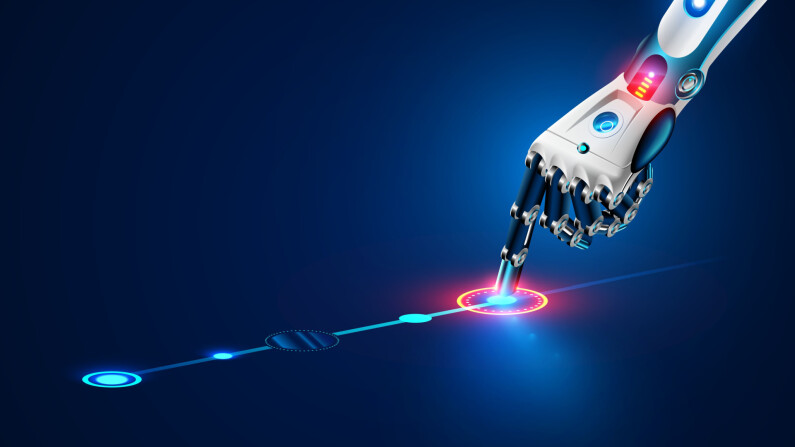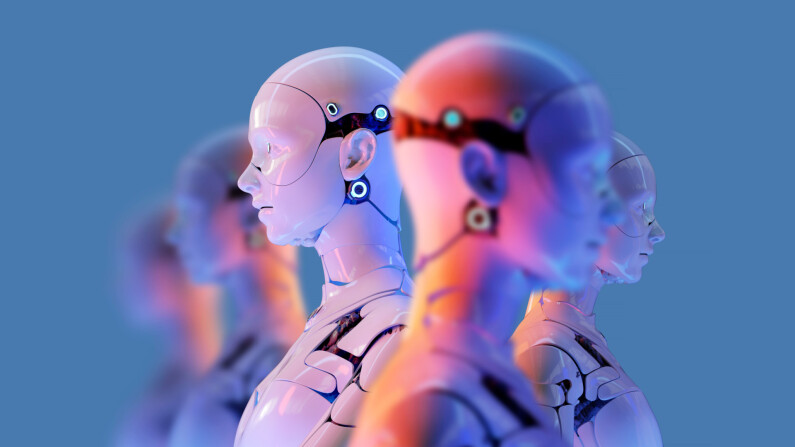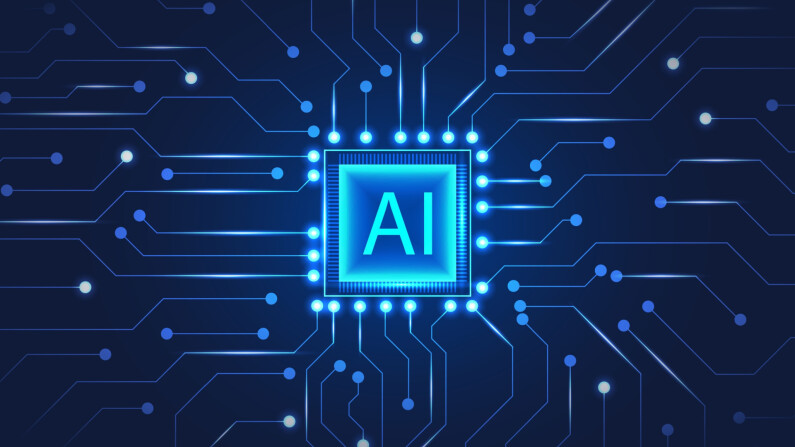Scientists announce that artificial intelligence can self-reproduce
A team of scientists from the University of Massachusetts and the University of California conducted a study, the results of which proved that AI models can reproduce smaller AI subsystems independently, without human assistance. They need to use an AI model with a parent algorithm, which will allow the automatic reconstruction of small AI systems to be launched.
“We are already using large neural networks to create smaller ones. See this as an older brother helping his younger brother improve. This is the first step towards a larger effort in self-evolving AI, the first step towards showing how AI models can create models of themselves,” said Yang Song, CEO of Aizip.
Self-evolving AI is capable of creating neural networks and other useful AI-based applications that can be used to perform everyday tasks and activities. In addition, AI models streamline the operation of electronic devices and various equipment, improve the use of hearing aids, analyse information received from satellites, monitor oil pipelines, and track rare species of animals that are on the verge of extinction.
“Our technology is a breakthrough because we have developed a fully automated reproduction algorithm for the first time. This makes developing an AI model without human intervention possible,” added Aizip researcher Professor Yubei Chen.
Americans deny rumours about the threat to humanity from AI
US Air Force Secretary Frank Kendall confidently stated that AI will not escape human control. He gave a speech at the Reagan National Defense Forum about it.
“These technologies cannot be stopped. It’s being embedded into all of our products, it is being used where it provides a competitive advantage, and the government needs to not get in the way of that,” Kendall said.
The Secretary also said that AI systems can be used in government and the military sphere. However, before introducing artificial intelligence, the US government must check its safety and assess all possible risks. Kendall emphasised, “We do need to find ways to evaluate this technology, become confident in it, have the ability to trust it, and to get it into fielded capabilities as quickly as we can.”
Earlier, US Vice President Kamala Harris called the risks of a “machine uprising” associated with the development of AI real. Nevertheless, the head of the American Air Force, Kendall, assured that a set of special measures will be developed to regulate the capabilities of AI to ensure that the technologies remain operating within the law. In addition, Kendall stated that the person behind the AI system will be held accountable for its every action.
The Threads app is now available in the EU

The US company Meta Platforms, owned by Mark Zuckerberg, has launched a social network in the European Union. Previously, residents of the European Union could not register on the platform and view content offered by other Threads users. The app was not accessible even using VPN services. The company said that the main reason for the delay in the release of the social network lay in strict rules for the use of digital technologies in the EU, designed to protect the confidential data of people using large online platforms.
Threads was first launched in July 2023 in over 100 countries. The social network is similar to Elon Musk's X app, formerly known as Twitter. Interestingly, the Threads platform has surpassed X in terms of the number of downloads in the App Store and Google Play. In the first week, more than 100 million users signed up for Threads. It is expected that after the launch of the app in Europe, the number of users will increase significantly, since more than 400 million people live there.
The official guide to artificial intelligence management has been published
MIT researchers have published a series of papers on how to manage AI systems in the US. The main policy work is entitled “A Framework for U.S. AI Governance: Creating a Safe and Thriving AI Sector.” The document proposes using existing American government structures to regulate AI tools in relevant areas.
MIT scientist and department head Dan Huttenlocher emphasises a pragmatic approach to AI control, which is to focus primarily on those areas of activity in which human labour begins to be regulated by AI. In turn, Asu Ozdaglar, the deputy dean of academics in the MIT Schwarzman College of Computing, believes that developers of AI systems are obliged to clearly formulate the purpose of their inventions, as this is crucial for their proper use.
The papers also address key issues related to managing neural networks and other AI-based applications. The AI Governance Agenda calls for improved auditing of AI tools and exploration of different ways to achieve this goal, such as government initiatives as well as suggestions from users of neural networks and other AI-based applications. Moreover, the scientists propose creating a self-regulatory organisation that will exercise operational control over the rapidly developing field of AI.
As such, A Framework for U.S. AI Governance: Creating a Safe and Thriving AI Sector, a key guide to AI management, aims to expand existing approaches to regulating AI systems and assigning responsibilities to more effectively oversee developments in this area. The initiatives proposed in a series of white papers will significantly reduce potential risks in the AI field and use all its benefits for the good of humanity.
Gemini AI outperforms GPT-4

Google has introduced a new neural network similar to ChatGPT from OpenAI. Today, Gemini is considered its most advanced and promising development.
Demis Hassabis, CEO and co-founder of Google DeepMind, presented Gemini as a multimodal neural network that can easily recognise various types of information, including numeric codes, texts, images, audio and video content. This eliminates the need for multiple neural networks or other AI applications. Additionally, one of Gemini's standout features is its sophisticated multimodal mindset, which allows it to extract information from vast data sets with remarkable accuracy.
Gemini is currently available in three optimised versions: Ultra, Pro and Nano. The Ultra model is the most powerful, surpassing the world's renowned experts and demonstrating unprecedented capabilities in performing completely different tasks, from encoding and encryption to multimedia creation. At the same time, Google specialists are actively collaborating with other experts to eliminate possible risks and ensure the most ethical implementation of the neural network.
OpenAI introduces the new GPT-4 Turbo
The GPT-4 Turbo model is a more powerful version of the GPT-4. Its performance has been optimised, and the cost of input tokens has also been reduced threefold, now reaching $0.01. In turn, the cost of output tokens has decreased by half compared to GPT-4, estimating at $0.03. The neural network database was also updated; now it has knowledge about current world events until April 2023. The previous GPT-4 version was limited to 2021.
The updated GPT-4 Turbo also received a 128 KB context window. This allows you to enter 300 pages worth of text as a query. The new model also supports voice output and image generation based on DALL⋅E3. There are six voice options available for voicing answers.
In addition, the new version of GPT-4 supports JSON mode. In one query, you can ask the neural network to perform several functions simultaneously by updating calls. The GPT-4 Turbo performs best in tasks that require careful following of instructions, thanks to improved instruction following and the introduction of JSON mode.
Microsoft and Siemens revolutionise the industry

The US-based corporation Microsoft and the German conglomerate Siemens AG have joined forces to develop an AI system designed to improve human performance in the manufacturing sector. The result of the collaboration is Siemens Industrial Copilot, a tool that enables increased productivity between people and machines.
The new AI-powered assistant can quickly generate, optimise and debug complex automation code to save time. Siemens Industrial Copilot also helps personnel in developing new products, organising production and further maintenance.
“This has the potential to revolutionise the way companies design, develop, manufacture, and operate. Making human-machine collaboration more widely available allows engineers to accelerate code development, increase innovation and tackle skilled labour shortages,” said Siemens CEO Roland Busch.
The first to use the so-called “copilot” were employees of the German Schaeffler AG company, manufacturing car parts. The invention is used to create programming code for automation systems, which allows reducing equipment downtime in factories.
Siemens continues to collaborate with Microsoft and is developing new AI-based products that will significantly improve productivity in industrial sectors, including heavy and light industry and other areas of production.
Scientists have found that the mechanism of AI memory formation is similar to the function of the human brain
A team of researchers from the Center for Cognition and the Institute of Basic Sciences (IBS) has identified striking similarities between memory processing in AI models and the hippocampus of the human brain. This opens a new perspective on memory consolidation, which is the process of converting short-term memories into long-term ones in AI systems.
In the rapidly evolving field of artificial intelligence, led by influential organisations such as OpenAI and Google DeepMind, understanding and replicating human-like intelligence has become an important research issue. The key to understanding powerful AI systems is realising how they learn and remember information. To find this out, the team applied principles of human brain learning, specifically focusing on memory consolidation through the NMDA receptor in the hippocampus, to AI models. They found that the long-term memory of an AI system could be improved by mimicking NMDA in the human brain.
Just as in the brain, where changing magnesium levels affects our memory, tuning the AI parameters to reflect the action of the NMDA receptor led to improved memory in the neural network model. C. Justin Lee, Director of Center for Cognition and Sociality, said: “This research makes a crucial step in advancing AI and neuroscience. It allows us to delve deeper into the brain’s operating principles and develop more advanced AI systems based on these insights.”
Amazon competes with OpenAI and Google

The US e-commerce platform is developing Olympus large language model (LLM) software. Amazon CEO Andy Jassy said this during the company's Q1 2023 earnings call. The company is investing millions of dollars in an innovative project to compete with such giants as OpenAI, Google, and Meta.
Like ChatGPT, the LLM is a deep learning algorithm that can recognise, summarise and generate text and other knowledge-based content from huge volumes of text data. We already know that the new Olympus language model will have two trillion parameters, while GPT-4 has 1+ trillion. It is being designed by the former head of the Alexa voice assistant development unit, Rohit Prasad. There are no other details about the creation of Amazon's largest AI model yet.
It is worth noting that the company already has large AI systems, for example, Titan. It is available to all AWS cloud service users.
Absci and AstraZeneca use AI to develop cancer treatments
Absci, a leader in generating generative antibodies using AI, has partnered with biopharmaceutical giant AstraZeneca to use artificial intelligence in the search for a new cancer treatment. The collaboration will build on Absci's integrated drug discovery platform to accelerate the breakthrough development process. There are no details yet.
Sean McClain, founder and CEO of Absci, said: “We’re proud to work closely with AstraZeneca to leverage our AI to bring novel treatments to oncology patients.”
Under the collaboration agreement, Absci will apply its pioneering generative artificial intelligence technology to create a therapeutic antibody candidate tailored for a specific cancer disease.
Puja Sapra, Ph.D., Senior Vice President of Biologics Engineering & Oncology Targeted Delivery, AstraZeneca also said, “This collaboration is an exciting opportunity to utilise Absci’s de novo AI antibody creation platform to design a potential new antibody therapy in oncology.”
Share this with your friends!





Be the first to comment
Please log in to comment